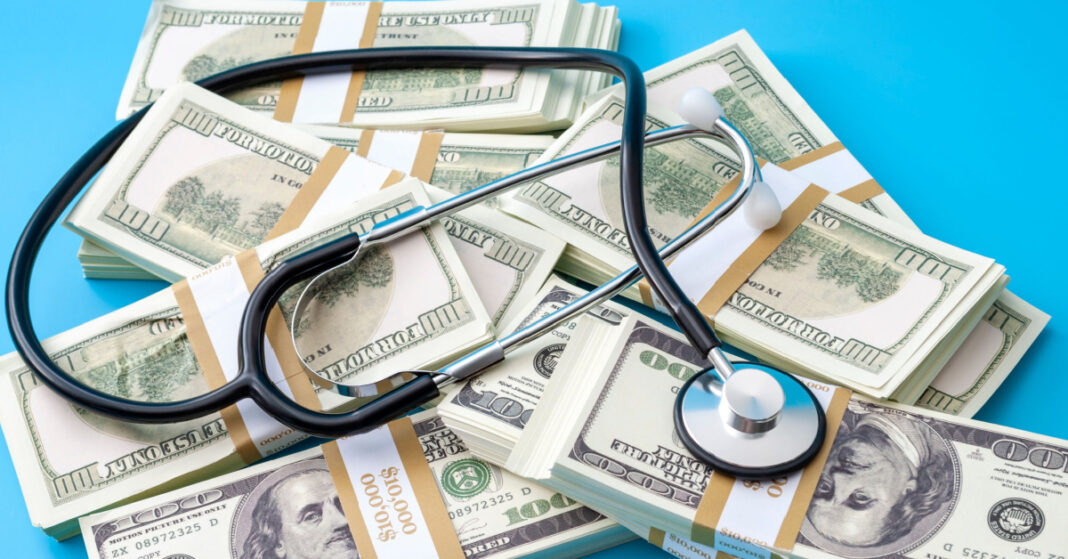Let’s start with a nod to my Super-Chef son, Magnus, in Dubai. Thanks to all who recently voted his school meals tops, his company Food Nation, actually won the annual assessment, hands down. He is officially the Best of All Arabia AGAIN in his category (Arabian Best of Best Award).
Here he is, looking very dapper, and receiving his award!

What I really like to boast is that he was on the platform for this year’s COP.* Magnus shared the honors with King Charles III. But he got more speaking time than the King! Haha!
[*The 2023 United Nations Climate Change Conference or Conference of the Parties of the UNFCCC, more commonly known as COP28, was the 28th United Nations Climate Change conference, held from 30 November until 12 December at Expo City, Dubai, United Arab Emirates- Wikipedia].
OK, down to business…
As you know, I have a summer home in France. The French have some funny ways, to say the least, BUT one shining light is that every year they produce a list of junk pharma drugs that are “more dangerous than useful”.
If only every country had such a list!
Trouble is, the drugs are still available in France; just deprecated.
The 2024 list (105 drugs) includes a cough medicine and an antibiotic. Each year for the past 12 years, the specialist medical review Prescrire has published an updated list of medicines whose serious side-effects are considered to be too risky or severe in comparison to the treatment they are intended to provide.
People are warned to avoid the medicines on the list, and doctors are advised to find alternatives when prescribing.
However 88 out of the 105 drugs are still available and can be legally prescribed. So Big Pharma scamming and lazy doctors are preventing the door being completely closed on this dangerous junk.
The most commonly used drugs on this year’s list include:
Moxifloxacin (sold under brands including Izilox). An antibiotic. This is “no more effective than other [antibiotics]”, the review said, but offers a greater risk of acute liver failure and heart problems.
Oxomemazine (Toplexil or other). A cough reliever. This “exposes patients to disproportionate adverse effects”, Prescrire said.
Aceclofenac (Cartrex or other) and diclofenac (Voltarene or other). Oral treatments for rheumatological conditions, but increase the risk of cardiovascular side effects including heart attack and heart failure.
Alzheimer’s disease treatments, including donepezil (Aricept), galantamine (Reminyl) and rivastigmine (Exelon). Most “have minimal and transient efficacy”, the review said, with disproportionate side effects.
I absolutely applaud this criticism. Dementia sufferer’s are being sold worthless garbage, on the understanding it is the “official” treatment and has successful science behind it. It is neither; just another Big Pharma heist, through lies, false labelling and false science.
None of these dementia treatments have been shown to be effective in slowing the progression of the illness, the Prescrire review added, but they are “associated with serious, sometimes fatal, side effects”
This year’s list also warns against a new immunosuppressant product named ‘teriflunomide’ (sold under brands including Aubagio), which is widely used to treat multiple sclerosis. According to Wiki, Teriflunomide was investigated in the Phase III clinical trial TEMSO as a medication for multiple sclerosis. The study was completed in July 2010. 2-year results were positive.
What do they mean by positive? If you believe this assessment, then I have bought land on the dark side of the moon and am farming up there most weekends. For a start, to claim the outcomes were “positive”, you have to ignore all the deaths, crippling and downside, which Big Pharma is very skilled at hiding.
Also, they are happy to produce a 2% improvement in a condition, lasting only a week, to call it a positive outcomes.
Other medicines on the list include treatments for a runny nose, cough, and sore throat. For these relatively less-serious conditions, the risk of side effects is considered to be far too high to justify the use of the drug.
These include decongestants, including Actifed Rhume, Dolirhume, Humex Rhume, Nurofen Rhume, and Rhinadvil. These contain a vasoconstrictor that is intended to improve the sensation of a blocked nose, but they can also cause a small but significant risk of heart attack (myocardial infarction) or stroke. The risk increases with high doses and long-term treatment.
So when the Prescrire warns of the unwanted risk factors of anti-inflammatories like Ibuprofen, take a look at what they mean (this side-effects list is from the Mayo Clinic website (https://www.mayoclinic.org/drugs-supplements/ibuprofen-oral-route/side-effects/drg-20070602):
[JUST FLIP THE LIST, YOU DON’T NEED TO READ IT ALL!]
More common
1. Abdominal pain
2. acid or sour stomach
3. belching
4. bloating
5. cloudy urine
6. decrease in amount of urine
7. decrease in urine output or decrease in urine-concentrating ability
8. diarrhea
9. difficulty having a bowel movement (stool)
10. excess air or gas in stomach or intestines
11. full feeling
12. heartburn
13. indigestion
14. itching skin
15. pain or discomfort in chest, upper stomach, or throat
16. pale skin
17. passing gas
18. nausea
19. noisy, rattling breathing
20. rash with flat lesions or small raised lesions on the skin
21. shortness of breath
22. swelling of face, fingers, hands, feet, lower legs, or ankles
23. troubled breathing at rest
24. troubled breathing with exertion
25. unusual bleeding or bruising
26. unusual tiredness or weakness
27. vomiting
28. weight gain
Less common
1. Abdominal cramps
2. stomach soreness or discomfort
Rare
1. Agitation
2. back, leg, or stomach pains
3. bleeding gums
4. blistering, peeling, loosening of skin
5. blood in urine or stools
6. bloody, black, or tarry stools
7. blurred vision
8. burning feeling in chest or stomach
9. change in vision
10. chest pain
11. chills
12. clay-colored stools
13. coma
14. confusion
15. constipation
16. cough or hoarseness
17. dark urine
18. decreased urine output
19. depression
20. difficulty breathing
21. difficulty swallowing
22. dilated neck veins
23. dizziness
24. dry mouth
25. extreme fatigue
26. fast, irregular, pounding, or racing heartbeat or pulse
27. fever with or without chills
28. frequent urination
29. general body swelling
30. general feeling of tiredness or weakness
31. hair loss, thinning of hair
32. headache
33. hives or welts
34. hostility
35. impaired vision
36. increased blood pressure
37. increased volume of pale, dilute urine
38. irregular breathing
39. irritability
40. itching
41. joint or muscle pain
42. lab results that show problems with liver
43. lethargy
44. light-colored stools
45. loss of appetite
46. lower back or side pain
47. muscle twitching
48. nosebleeds
49. painful or difficult urination
50. pains in stomach, side, or abdomen, possibly radiating to the back
51. pinpoint red spots on skin
52. puffiness or swelling of the eyelids or around the eyes, face, lips, or tongue
53. rash
54. red skin lesions, often with a purple center
55, red, irritated eyes
56. redness of skin
57. seizures
58. severe abdominal pain, cramping, burning
59. severe and continuing nausea
60. sore throat
61. sores, ulcers, or white spots in mouth or on lips
62. stiff neck or back
63. stomach upset
64. stupor
65. swollen or painful glands
66. tenderness in stomach area
67. thirst
68. tightness in chest
69. unpleasant breath odor
70. upper right abdominal pain
71. vomiting of blood
72. vomiting of material that looks like coffee grounds
73. wheezing
74. yellow eyes and skin
Some side effects may occur that usually do not need medical attention. These side effects may go away during treatment as your body adjusts to the medicine. Also, your health care professional may be able to tell you about ways to prevent or reduce some of these side effects. Check with your health care professional if any of the following side effects continue or are bothersome or if you have any questions about them:
More common
1. Continuing ringing or buzzing or other unexplained noise in ears
2. hearing loss
3. nervousness
Rare
1. Crying
2. depersonalization
3. discouragement
4. dry eyes
5. dysphoria
6. euphoria
7. feeling sad or empty
8. lack of appetite
9. loss of interest or pleasure
10. mental depression
11. paranoia
12. quick to react or overreact
13. rapidly changing moods
14. runny nose
15. sleepiness or unusual drowsiness
16. sleeplessness
17. sneezing
18. stuffy nose
19. trouble concentrating
20. trouble sleeping
OK, just a boring list. But you get the point, I hope. A lot of OTC products are, frankly, DANGEROUS. Pill-poppers for example will go to town on Tylenol (paracetamol) believing it is quite safe, especially for children. It has emerged as one of the most disastrous pain killers available, short of opiates. It probably causes autism (routinely used for post-vaccination fevers); serious psychiatric side-effects, including dulled emotional responses to both positive and negative stimuli; it depletes glutathione; and it is very liver toxic. In the US alone, each year acetaminophen causes over 100,000 calls to poison control centers; 50,000 emergency room visits, 26,000 hospitalizations, and more than 450 deaths from liver failure.
Worst of all, Tylenol is now associated with Stevens-Johnson syndrome, a rare but severe, and sometimes fatal skin reactions even at recommended dosages.
It’s time this drug was removed permanently. But of course the FDA won’t do that, because Big Pharma (who runs the FDA), won’t let them.
Yes, another rant! Not sorry!
To Your Good Health,
Prof. Keith Scott-Mumby
The Official Alternative Doctor
Let’s finish positive with a short animation of my son Magnus, grinning his head off, with his right-hand man, Nishal:





